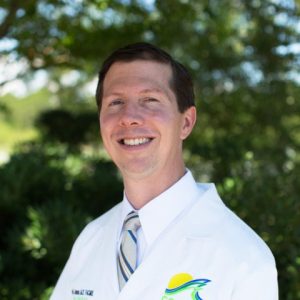Dr. David Adams | FAQs
Dr. David Adams is a board certified dermatologist and a Fellowship-Trained Mohs surgeon who is the founder of Coastal Skin Surgery and Dermatology. We asked Dr. Adams to share some of the most common questions heard by his patients and he obliged.
Do you ever wonder what type of sunscreen a dermatologist would recommend in sunny Florida, how to detect a potential skin abnormality, or what designates a Fellowship-Trained Mohs Surgeon? These questions are asked frequently by patients and answered on numerous occasions by physicians. Dr. David Adams of Coastal Skin Surgery & Dermatology of the Emerald Coast reveals the answers to some of his most FAQs.
Q. What is the best sunscreen?
A. The best sunscreen is any sunscreen you’re going to consistently use. Every one of us has very different and unique skin. We also have very different and unique likes and dislikes. Sunscreens that are available on the market today are better than they have ever been. There are for broader spectrum sun protection that come in a variety of vehicles (i.e., creams, lotions, sprays, etc.). I have found that different sunscreens work well on different parts of the body. Sprays and aerosols are often convenient and effective to be applied to large surface areas such as the back, the arms, and legs. Lotions and liquids are often times more suitable for the face and neck areas, but this is often a matter of personal choice. It is not always simple are easy to find the sunscreen that we like the best, but often the best way is to try different sunscreens and be willing to experience them on different parts of body to see what works well for you.
Q. How do I identify a potential skin cancer?
A. Skin cancers are not always obvious and they certainly don’t come with labels. All skin cancers develop on perfectly normal and healthy skin. Many people understandably mistake an early skin cancer for a pimple or a wart or a dark freckle. Skin cancers can often masquerade as normal skin until they start behaving in an unusual manner, such as changing shape, color, size, or going through cycles of bleeding and healing. Sometimes, the presentation of a skin cancer is not crystal clear even to the dermatologist, and a biopsy is always necessary to establish the proper diagnosis in any circumstance. If you identify any new or suspicious lump, bump, or spot, then I strongly encourage you to see your primary care physician or to directly see your dermatologist. In the state of Florida, a referral is not necessary to see the dermatologist.
Q. What is Mohs Micrographic Surgery and what makes Fellowship Training so important?
A. Mohs micrographic surgery is regarded as the gold standard of skin cancer removal for most types of skin cancer. The name “Mohs” is credited to Dr. Frederick Mohs, he developed this procedure approximately 85 years ago. Mohs micrographic surgery is performed in the office setting under the safety of local anesthesia. The intention of Mohs micrographic surgery is to remove the entirety of the skin cancer while preserving as much of normal skin as possible. In Fellowship-Trained hands, Mohs micrographic surgery offers cure rates in excess of 99% for basal cell carcinoma and 97% for squamous cell carcinoma. The advantages of Mohs micrographic surgery are that it achieves the highest cure rates, keeps the surgical defects as small as possible; this allows the repairs to be smaller and more simple, and allows recovery times to be shorter and cosmetic outcomes to be better. Fellowship training is important because it insures that your surgeon has been properly trained to perform all of the aspects of Mohs micrographic surgery, ranging from tumor removal and microscopic interpretation to advanced cosmetic repair. Fellowship training insures that your dermatologist has the highest level of professional training and expertise to properly address the removal of any skin cancer and facilitate optimal cosmetic reconstruction. To see if your Mohs Surgeon is Fellowship-Trained or to find a Fellowship-Trained Mohs Surgeon, just visit the website: www.mohscollege.org. Your Plastic Surgeon is Fellowship-Trained. Your cardiologist is Fellowship-Trained. You’re oncologist is Fellowship-Trained. How about your Mohs surgeon? Your face is no place for on-the-job training!

